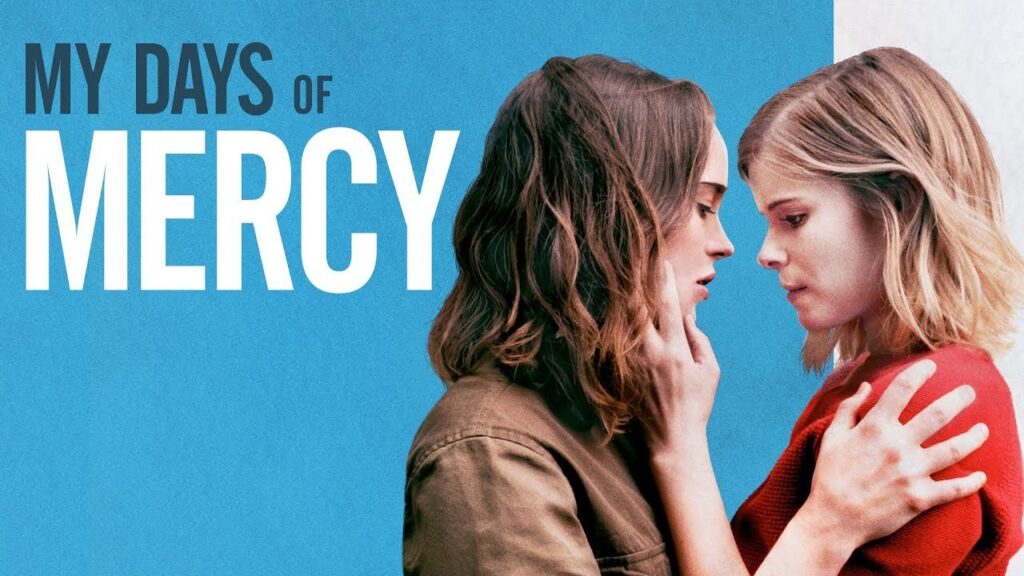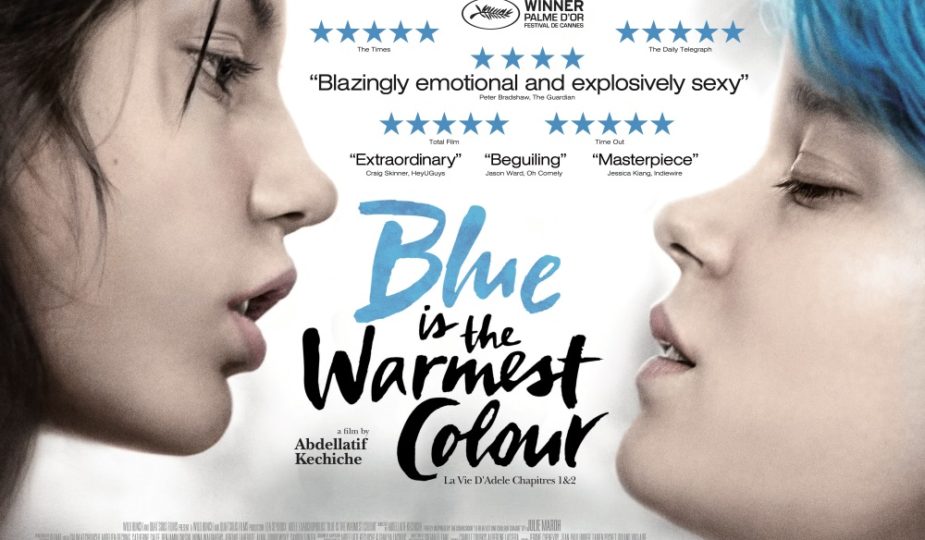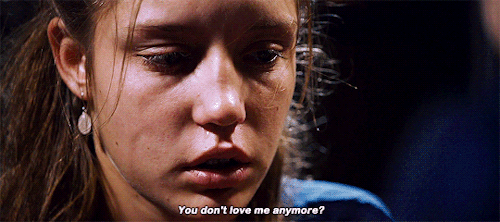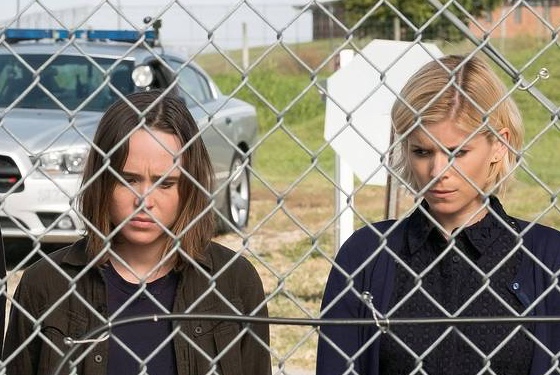
While browsing through Rotten Tomatoes the other day, I thought to myself, “Why is there a movie from 2017 listed under ‘Top DVD and Steaming?’” I routinely come across films that have technically been released prior to the year they became available to the general public, and often those show up on my ‘Favorite Films of [year]’ lists with a big disclaimer. Even more notably, My Days of Mercy is currently sitting at 94% on Rotten Tomatoes – a clear indicator that I had to see it…right?
I’m well aware that the Rotten Tomatoes system is rather flawed. It’s generally skewed toward mediocre or inoffensive films that few critics would dare give a negative review. My Days of Mercy definitely falls into that category.

My Days of Mercy has the pleasure of being released in post-Blue Is The Warmest Color America. In 2013, viewers couldn’t get enough of the 3-hour French lesbian drama, and it even received a Golden Globe nomination. Some championed the film as a triumph of LGBTQ+ representation in cinema, and I suppose that’s somewhat accurate, even though I understand the opposing viewpoints there. It was certainly influential, and in the years following its release, studios began to have more faith in the generic lesbian romance. Two years later, Carol (a far superior forbidden lesbian romance movie) was nominated for six Academy Awards, while The Danish Girl (in which Eddie Redmayne tries to play a transsexual character) was nominated for two, with Alicia Vikander winning Best Supporting Actress.
It was nice to see this level of LGBTQ+ representation, however, there’s one big limiting factor here. When you absolutely know that there’s a concrete audience out there for a film because it touches on a hot-button issue, it can be really, really easy to half-ass it. More importantly, you can get away with distributing mediocre films when you can point to another with a similar premise that has been successful on both a critical and commercial level.
In the race to emulate its success, most people forget one important aspect of Blue is the Warmest Color:
IT’S FUCKING BORING!

It’s okay. You can say it. This is a safe space. For all its visual frills, it’s still a 3-hour film with two characters who spend the run-time either undressing each other with their eyes or literally undressing each other. It’s stylish (or rather, stylishly dull), but its motifs are shallow and unoriginal. For such a long film, its pacing is so-so, and that makes or breaks long movies for me. It’s definitely not a terrible film, but it’s a fucking slog after the one-hour mark. I know there are plenty who disagree with me, and that’s fine, but I think the socially-charged nature of the film prevents people from coming clean about falling asleep in the theater.
That being said, the LGBTQ+ dramas that came after weren’t all so terrible. Carol is one of my favorites, mostly for the beautiful direction of Todd Haynes – his best work since telling the Karen Carpenter story with Barbie dolls. There are other examples of well-made films of the post-BitWC era, but none notable enough to stick out in my mind as belonging to that very specific subsection of movies. I should probably clarify that ‘romantic dramas with lesbian leads’ are not precisely what I’m complaining about. What really pisses me off is how interchangeable and generic most of these films are, because they already have a built-in gimmick: lurid girl-on-girl action. These imitators had such a palpable attitude of ‘doing it for the money and not giving a fuck’ that I can’t help but look back on NiQuil is the Warmest Color with longing and admiration.

My Days of Mercy is the dregs of this era. It’s the stale leftovers of a time when studios equated lesbians with dollar signs. In that regard, I’m glad this film took so long to find distribution through Lionsgate, because its chances of real success at this point are pretty abysmal. The VOD release is clearly one final attempt to milk money out of a dying micro-genre as it lets out an unaffected sigh of relief.
As far as the movie is concerned, there’s really only one notable aspect, and that’s the premise. Ellen Page is an anti-death-penalty protestor whose father may or may not be a murderer. She falls in love with a counter-protester/lawyer played by Kate Mara. That appears to be a fairly interesting setup, until it sets in two seconds later and you realize that IT MAKES NO GODDAMN SENSE. Even worse, the way the plot unfolds invalidates the opinions of those who oppose the death penalty, and everything is set up to play out like any other forbidden romance.
It becomes extremely apparent from the very beginning that Lucy (Ellen Page) and her family are in denial about the fact that their father is a murderer. He killed their mother and set the scene up to look like a robbery, but the family still has faith that he’s innocent. This denial fuels their zeal for anti-death-penalty protests, and they take that show on the road, turning protest into a career.
I tend to think of the death penalty (as a political issue) in the same way I think of abortion. Most people have strong, polarized opinions on these topics, and discussions around them usually end in resentment, attempted conversion, and/or blood. When Mercy (Kate Mara) just casually begins an affair with Lucy knowing full well that Lucy’s whole life revolves around this issue, I realized that suspension of disbelief was going to be a requirement. This is unfortunate, because at its core, the film has noble intentions regarding how people treat one another based on singular ideologies. When a movie’s goal is to further social progress, I should NOT have to suspend my disbelief unless the film is an allegory.
Early on in the film, we are introduced to Lucy’s older sister Martha (Amy Seimetz) and shitty lawyer Weldon (Brian Geraghty). This leads to the strangest, most unnecessary sub-plot I’ve seen in quite some time. Lucy’s family is poor “white trash,” and because they can’t afford a real lawyer, Martha trades sexual favors for legal counsel from Weldon. There are times when this relationship is treated like the disgusting, vile exploitation that it is, but there also exists an underlying implication that Weldon is in love with Martha, and even that the feeling might be mutual. Weldon’s character does not operate in some kind of moral gray area, but the script tries to backpedal on his creepy (and obviously illegal and unethical) actions several times. It’s fairly disgusting, and it never once feels like the film would have suffered were his character omitted.
After an hour of watching Ellen Page and Kate Mara almost have sex, then have sex, then almost have sex again, Mercy offers to call in a favor for Lucy. Her law firm has connections with a DNA testing lab, and she’s willing to send the original evidence against Lucy’s father to be re-tested in hopes of clearing his name. Weldon advises against this because her father has a giant tattoo on his forehead that says, “GUILTY”, but Lucy goes through with it anyway. The results of the test are positive, confirming that this jackass definitely killed his wife, and we’re supposed to be surprised.

Distraught, Lucy goes to Mercy’s house for some…comfort. What she finds is the family of the officer killed in the line of duty while pursuing Lucy’s father, and of course, Mercy’s boyfriend. Mercy explains that she needs to come out in her own time, triggering a third-act breakup. The next time the two meet, Mercy makes an unexpected appearance at the execution of Lucy’s father, which is shitty in ways this film just doesn’t understand.
Years later, Lucy is working at a diner, and Mercy walks in. Lucy meets Mercy in the alley for a smoke break, and proceeds to tell her why they can’t be together even though Mercy broke up with her boyfriend. Her logic is pretty sound. It’s a really, really fucked up situation. In spite of reason, love conquers all, and the two agree to go on a date before the end credits roll, undermining Page’s obligatory 2-minute speech entirely.

There are at least a few fragments of this plot that are compelling, but at every turn, the script sabotages itself by failing to deliver. Going into this, I fully expected at least one aspect to stand out, and that’s the acting. Unfortunately, this too is lackluster and unsatisfying. Ellen Page has churned out similar performances in the past, and as always, she’s not dynamic enough to pull it off. She spends much of the film moping, and when she isn’t doing that, she’s fucking Kate Mara. Mara doesn’t really pull off much emotional depth either, and she mirrors Page’s sad-eyed expression for most of the film. It’s almost as if the two leads are doing impressions of each other doing impressions of Hayden Christensen and Natalie Portman in the Star Wars Prequels. Some of the dialog even reaches that level of cringe.
While the film’s incompetence and implausibility bothered me, I still feel the need to search for positives in this turd of a movie. Even then, nothing at all stands out to me. It’s a bland romantic drama that finds itself giving in to the male gaze, and the only aspect that separates it from the flock of LGBTQ+ dramas before it is the death row scenario.
Just skip this movie. It took more than a year after its TIFF premiere to receive distribution for a reason. Don’t bother with yesteryear’s trash.
2.5/10